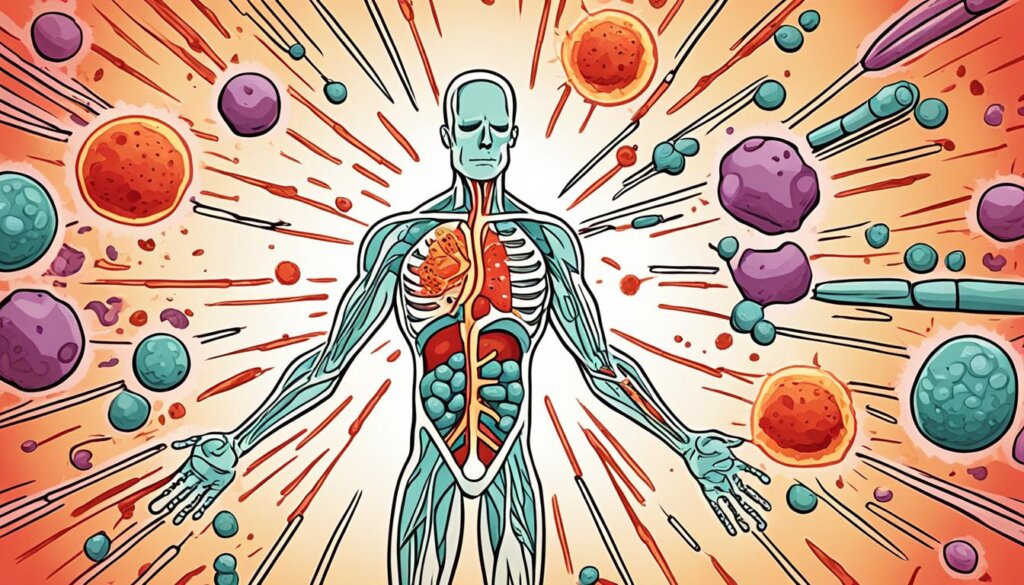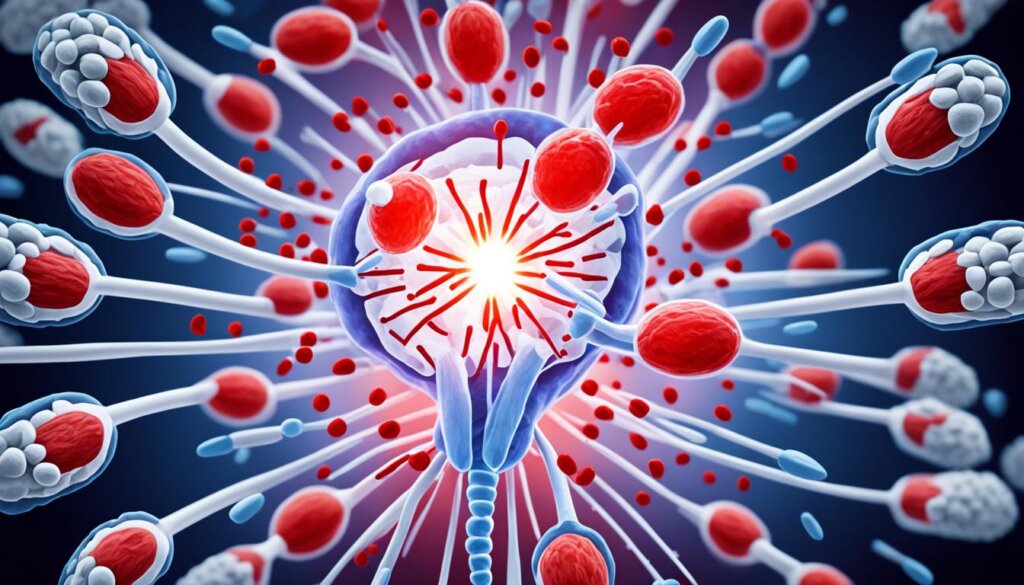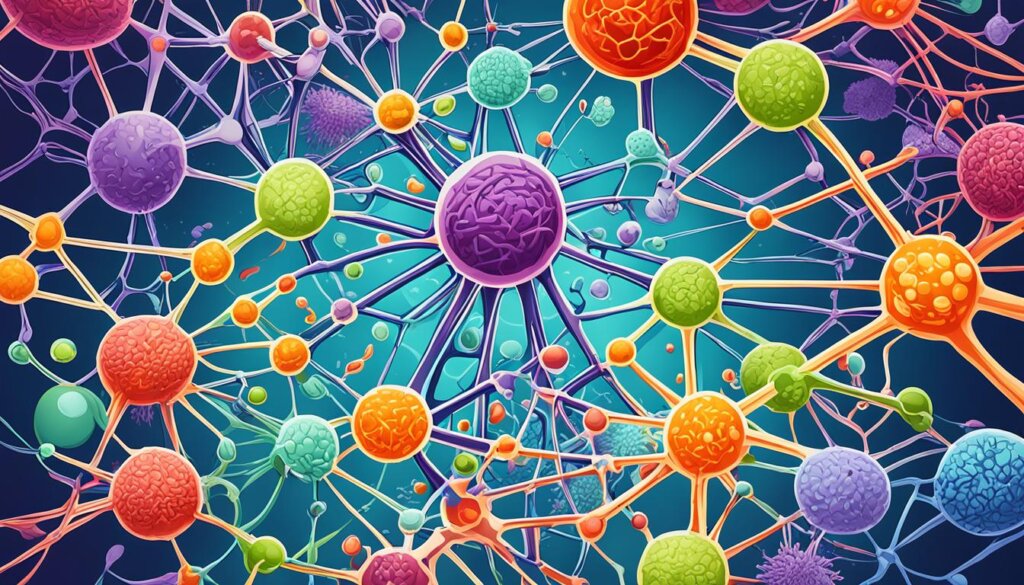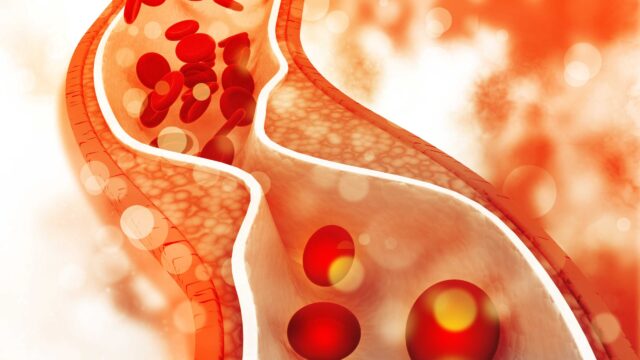FTC disclaimer: This post may contains affiliate links and we will be compensated if you click on a link and make a purchase.
Imagine your immune system, meant to protect you, attacking you instead. This happens to millions with autoimmune disorders. These conditions make the immune system attack healthy cells and tissues. There are over 80 types of these diseases. They can harm many organs and systems, making life hard.
It’s important to know about autoimmune disorders, their causes, and new treatments. This article will cover the types, causes, symptoms, and treatments. It aims to help manage these diseases better.
Key Takeaways
- Autoimmune disorders happen when the immune system attacks the body’s healthy cells and tissues.
- There are over 80 known autoimmune disorders that can affect various organs and systems.
- Symptoms of autoimmune disorders can range from mild to severe, including fatigue, joint pain, rash, and malaise.
- Diagnostic tests for autoimmune disorders can include blood tests and imaging scans.
- Treatments aim to control the autoimmune process, maintain the body’s ability to fight disease, and reduce symptoms.
Understanding Autoimmune Disorders
Autoimmune disorders are complex conditions where the immune system attacks healthy cells and tissues by mistake. This leads to chronic inflammation, tissue damage, and many symptoms. These can greatly affect someone’s life.
What is an Autoimmune Disorder?
Autoimmune disorders happen when the immune system doesn’t work right. It’s meant to protect us by fighting off viruses and bacteria. But in these disorders, it mistakes the body’s own cells for enemies. This leads to inflammation and damage.
The Role of the Immune System
The immune system is key to keeping us safe from harm. It’s made up of many cells and organs that work together to fight off diseases. In autoimmune disorders, it gets mixed up and attacks our own cells instead. This is why different autoimmune disorders have different symptoms.
“The immune system’s primary job is to guard against germs like bacteria, viruses, fungi and parasites, which can cause infections and disease. In an autoimmune disease, the immune system cannot tell the difference between these foreign invaders and the body’s own healthy tissues.” – National Institutes of Health
Common Autoimmune Disorders
Autoimmune disorders can affect many organs and systems. Researchers have found over 100 types. Some common ones are rheumatoid arthritis, lupus, multiple sclerosis, and more. Each has its own symptoms and treatments.
These disorders can hit different parts of the body, like blood vessels and skin. Sometimes, a person can have more than one at once.
- Rheumatoid arthritis mainly affects joints, causing pain and damage.
- Lupus is an autoimmune disease that can harm many organs, including the skin and kidneys.
- Multiple sclerosis affects the central nervous system, causing muscle weakness and vision issues.
- Inflammatory bowel diseases like Crohn’s disease cause inflammation in the digestive system.
- Type 1 diabetes happens when the immune system attacks insulin-producing cells, leading to high blood sugar.
- Graves’ disease and Hashimoto’s thyroiditis affect the thyroid gland, causing thyroid problems.
- Psoriasis is a skin condition marked by red, scaly patches.
Symptoms of these disorders include fatigue, fever, and joint pain. Doctors use tests like ANA tests to diagnose them.
There’s no cure, but treatments help manage symptoms and fight the disease. Options include medications and lifestyle changes.
Autoimmune disorders affect people differently based on their gender, age, and ethnicity. Women between 15 and 44 are more likely to get one than men. Some conditions, like lupus, are more common in African Americans and Hispanics.
Causes and Risk Factors
The exact causes of autoimmune disorders are not fully known. But, both genetic and environmental factors are key in their development. Some genes make people more likely to get autoimmune conditions. Then, things like infections, chemicals, and some medicines can start these diseases in those people.
Genetic Predisposition
Autoimmune diseases come from a mix of genes and the environment. Things like gender, race, and ethnicity affect the risk. In the U.S., about 50 million people have an autoimmune disease, making it a big health issue. Most, nearly 80%, of those with chronic autoimmune diseases are women, showing a big gender difference.
Environmental Triggers
Things like UV rays, poverty, chemicals, and mercury can lead to autoimmune diseases. Scientists are working hard to understand how genes and the environment work together. They want to know how this affects the risk and course of autoimmune diseases.
Autoimmune diseases can start from many environmental things, like infections, toxins, and some medicines. Being exposed to pollutants, silica, UV rays, and solvents is linked to these diseases. Viruses like Epstein Barr and Group A Streptococcus make people more likely to get autoimmune diseases.
The SARS-CoV-2 virus has been found to cause some autoimmune conditions. Some medicines, like blood pressure drugs and antibiotics, can also cause autoimmune diseases.
“Environmental factors like diet, physical activity, medication side effects, toxins, and smoking can impact the development of autoimmune diseases.”
In summary, autoimmune disorders have complex causes, mixing genes and environment. Knowing these factors is key for finding ways to prevent and treat these diseases.
Symptoms of Autoimmune Disorders
Autoimmune disorders show many symptoms, which change based on the condition and affected organs. These symptoms can really affect someone’s life. They often need quick medical help and the right treatment.
General Symptoms
Common signs of autoimmune disorders are feeling very tired, having a fever, muscle pain, joint pain and swelling, and skin rashes. These symptoms can change, making it hard to diagnose and manage them.
Organ-Specific Symptoms
Some autoimmune conditions have symptoms specific to certain organs. For example, Crohn’s disease and ulcerative colitis cause stomach problems. Multiple sclerosis can affect your vision. Graves’ disease or Hashimoto’s thyroiditis can mess with your thyroid.
Spotting these symptoms early is key for getting the right diagnosis and treatment. But, doctors find it hard to diagnose autoimmune diseases because there’s no one test for them and the symptoms can be confusing.
Autoimmune Disease | Organ-Specific Symptoms |
|---|---|
Inflammatory Bowel Disease | Digestive issues, abdominal pain, diarrhea |
Multiple Sclerosis | Vision problems, numbness, tingling, balance issues |
Graves’ Disease | Thyroid dysfunction, rapid heartbeat, weight loss |
Hashimoto’s Thyroiditis | Thyroid dysfunction, fatigue, weight gain |

Knowing about the many symptoms of autoimmune disorders is key to getting the right medical help and treatment. With the right care, people with these conditions can feel better and live better lives.
Rheumatoid Arthritis (RA)
Rheumatoid arthritis (RA) is an autoimmune disorder that mainly affects the joints. It causes inflammation, swelling, and pain. The immune system mistakenly attacks the lining of the joints. This leads to joint damage and disability if not treated.
Symptoms and Diagnosis
Symptoms of RA include joint stiffness, especially in the morning. You may also see swelling and redness in the affected joints. Doctors call it “early rheumatoid arthritis” if symptoms last less than six months.
To diagnose RA, doctors do blood tests for autoantibodies and imaging studies. If you have RA, your sed rate is likely higher than normal. You need an ESR of ≥ 28 mm/hr to join clinical trials for RA. With treatment, your sed rate may go down.
Treatment Options
Treatment for RA aims to reduce inflammation and slow disease progression. It often includes DMARDs and biologic agents that target the immune system. The ADA says a disability is a physical or mental impairment that limits major life activities.
If RA affects your daily life, you might qualify for disability benefits from the Social Security Administration.
“Rheumatoid arthritis can lead to joint damage and disability if left untreated or if treatments prove ineffective.”
Systemic Lupus Erythematosus (SLE)
Systemic lupus erythematosus (SLE), also known as lupus, is a complex autoimmune disorder. It can affect many parts of the body. In lupus, the immune system attacks the body’s own tissues. This leads to inflammation and damage. Symptoms include joint pain, skin rashes, fever, fatigue, and problems with organs like the kidneys, heart, and lungs.
SLE is more common in women than men by nearly 10 to 1. It often starts in young women between 15 and 44. In the US, it’s more common in African Americans, Asian Americans, African Caribbeans, and Hispanic Americans. Almost all people with SLE test positive for antinuclear antibody (ANA). In the US, SLE is one of the top 20 causes of death in women aged 5 to 64.
To diagnose SLE, doctors use blood tests, physical exams, and look at the patient’s medical history. Treatment often includes corticosteroids and immunosuppressants to control symptoms and stop the disease from getting worse.
“Lupus is more common in women and often diagnosed between the ages of 15 and 45.”
SLE is usually more active in the first years after diagnosis and in people under 40. Many women with SLE can have healthy babies with the right treatment. But, lupus nephritis can cause kidney failure in some.
Severe SLE can lead to blood clots, anemia, heart and lung problems, pregnancy issues, stroke, bowel damage, and harm to various organs. It also raises the risk of cancer, but the risk is low. Women with lupus face a higher risk of miscarriage.

Overall, systemic lupus erythematosus is a complex autoimmune disease. It can greatly affect a person’s health and life quality. With the right diagnosis and treatment, many people with SLE can control their symptoms and lower the risk of serious problems.
Multiple Sclerosis (MS)
Multiple sclerosis (MS) is an autoimmune disorder that attacks the central nervous system. It targets the myelin sheath that protects nerve fibers. This damage, called demyelination, messes up how electrical signals move in the nervous system. This leads to many different symptoms.
Types and Progression
MS comes in different types, each with its own way of getting worse. The most common type is relapsing-remitting MS. This means you have new symptoms or relapses followed by times when you get better. To be diagnosed with this type, you need to have at least 2 attacks that happen one month apart and damage in more than one area of the central nervous system.
Other types of MS include primary progressive and secondary progressive. Primary progressive gets worse over time without clear relapses. Secondary progressive starts after an initial relapsing-remitting phase.
Managing MS Symptoms
Dealing with MS symptoms often means using medicines, physical therapy, and changing your lifestyle. Symptoms include weakness, numbness, shaking, vision loss, pain, paralysis, balance issues, and problems with bladder and bowel. These can lead to more serious issues like bedsores, infections, muscle problems, and pneumonia. Social, job, and mental health problems can also happen, like losing your job, having trouble with relationships, and feeling depressed.
To diagnose MS, doctors might use MRI scans, evoked potentials, cerebrospinal fluid analysis, blood tests, eye exams, and visual fields measurements. Treatments include medicines that help with inflammation and acute relapses, like steroids and plasma exchange.
Managing MS well means taking your medicine, joining clinical trials, using mobility aids, doing rehab, making your home safe, and getting support from doctors and family. With the right care, people with MS can keep living a good life and stay less disabled.
“Although there is no cure for MS, there are treatments that can help slow the progression of the disease and manage symptoms.”
Research shows that some lifestyle changes can help with MS symptoms too. For example, staying active can lower the chance of MS attacks. Women are more likely to get MS than men, and having a family history of it makes you more at risk.
MS is a tough autoimmune disorder, but with the right medical care, rehab, and lifestyle changes, people with MS can still live well and handle their symptoms.
Autoimmune Disorders
Autoimmune disorders happen when the immune system attacks the body’s own cells and tissues. This leads to chronic inflammation and many symptoms. They can affect many parts of the body, like the joints, skin, and nervous system.
The exact reasons for these disorders are not clear. But, genetics and environment likely play a part. About 5% of people have these diseases, and most are women.
Some common ones are thyroiditis, rheumatoid arthritis, and vasculitis. Less common ones include lupus. Knowing about these conditions helps in managing them better.
These diseases can be local or affect many parts of the body. There’s no cure, but treatments like NSAIDs and immunosuppressive drugs are available.
Research is looking into how stress affects the immune system and these diseases. Understanding these conditions helps doctors find better ways to manage them.
Autoimmune Disorder | Affected Body System | Symptoms |
|---|---|---|
Rheumatoid Arthritis | Joints | Joint pain, swelling, stiffness |
Lupus (SLE) | Multiple organs | Fatigue, joint/muscle pain, skin rashes |
Multiple Sclerosis | Nervous system | Vision problems, numbness, muscle weakness |
Psoriasis | Skin | Scaly, itchy skin patches |
Hashimoto’s Thyroiditis | Thyroid gland | Fatigue, weight gain, neck swelling |
Autoimmune disorders greatly affect a person’s life. We need more research to understand and treat them better. By supporting research, we can help those with these conditions live better lives.
Inflammatory Bowel Disease (IBD)
IBD is a group of autoimmune disorders that mainly affect the gut. It includes Crohn’s disease and ulcerative colitis. The exact cause of IBD is still unknown, but it might be linked to genes, family history, and environment. Having a family history of IBD is a big clue to its genetic roots. About 20% of people with IBD have a family link to the disease.
Crohn’s Disease
Crohn’s disease can hit any part of the digestive tract, from mouth to anus. Signs include diarrhea, belly pain, bleeding from the rectum, losing weight, and feeling very tired.
Ulcerative Colitis
Ulcerative colitis targets the colon and rectum’s lining. Its symptoms are diarrhea, belly pain, rectal bleeding, and a higher chance of colon cancer. IBD, especially ulcerative colitis, raises the risk of colon cancer.
Diagnosing IBD often means doing stool tests, blood work, X-rays, and scopes. A special diet can ease symptoms like diarrhea and belly pain in people with IBD.
Treatment for IBD combines medicines, diet changes, and sometimes surgery to manage symptoms and prevent problems. People with IBD may face issues with their joints, eyes, and skin too.
Characteristic | Crohn’s Disease | Ulcerative Colitis |
|---|---|---|
Location of inflammation | Any part of the digestive tract | Lining of the large intestine (colon) and rectum |
Symptoms | Diarrhea, abdominal pain, rectal bleeding, weight loss, fatigue | Diarrhea, abdominal pain, rectal bleeding, increased risk of colon cancer |
Risk Factors | IBD is more common in white people and Jews, especially Ashkenazi Jews. | IBD increases the risk of colon cancer, particularly ulcerative colitis. |
“Inflammatory bowel disease is a complex condition that can have a significant impact on a person’s quality of life. Understanding the different types of IBD, their causes, and available treatments is crucial for effective management and improving patient outcomes.”
IBD usually starts in the 20s to 30s, and another peak is in the 50s and 60s. About 1 in 5 adults in the U.S. show signs of irritable bowel syndrome, but only a few seek medical help. Women, those with a family history, or those with anxiety or depression are more likely to have irritable bowel syndrome. This condition can be mild, severe, or even go away sometimes.
Thyroid Autoimmune Disorders
The thyroid gland is in the neck and helps control the body’s metabolism and hormones. Autoimmune disorders can harm the thyroid, causing too much or too little thyroid hormone. Graves’ disease and Hashimoto’s thyroiditis are two common types.
Graves’ Disease
Graves’ disease makes the thyroid produce too many thyroid hormones. This can lead to a fast heart rate, losing weight, and eyes bulging out. Women are about 7 times more likely to have Graves’ disease compared to men. It often starts because of genes, with 80% of the risk coming from certain genes related to the immune system.
Hashimoto’s Thyroiditis
Hashimoto’s thyroiditis slowly destroys the thyroid gland, making it make less thyroid hormone. Symptoms include feeling very tired, gaining weight, and feeling cold easily. Hashimoto’s disease is most common among middle-aged women, and women are much more likely to get it compared to men. Having another autoimmune disease or a family history of thyroid problems raises the risk of getting Hashimoto’s disease.
Treatment for these disorders often includes medicine or surgery to fix hormone levels. Finding and treating it early is key to staying healthy and feeling good.

“Autoimmune thyroid diseases (AITD) affect 2-5% of the population, with women affected at a rate of 5-15% and men at a rate of 1-5%.”
Skin Autoimmune Disorders
Autoimmune disorders can greatly affect the skin, causing chronic and severe conditions. Psoriasis and scleroderma are two main skin autoimmune disorders.
Psoriasis
Psoriasis makes skin cells grow too fast, leading to scaly, red patches on the skin. It happens when the immune system attacks the body’s own tissues. This causes chronic inflammation and skin problems.
Scleroderma
Scleroderma, or systemic sclerosis, affects the skin and connective tissues. It makes the skin hard and tight. It can also harm organs like the lungs, heart, and stomach.
Psoriasis and scleroderma have an overactive immune system. This leads to chronic inflammation, tissue damage, and skin problems. To manage these disorders, treatments include creams, medicines, and lifestyle changes.
“Autoimmune skin diseases are complex and can significantly impact a person’s quality of life. However, with proper diagnosis and treatment, many patients can manage their symptoms and maintain good skin health.”
It’s important to know about skin autoimmune disorders like psoriasis and scleroderma. Healthcare workers and those with these conditions need to stay informed. By getting the right medical care, people can better manage their skin issues and improve their health.
Diagnosing Autoimmune Disorders
Finding out if you have an autoimmune disorder can be hard. Symptoms can look like other health issues. Doctors start by looking at your health history and doing a physical. Then, they use blood tests and imaging studies.
Blood Tests
Blood tests like the ANA test and tests for specific autoantibodies check for an autoimmune response. These tests help figure out what’s causing your symptoms. They help doctors make a correct diagnosis.
Imaging Tests
Tests like X-rays, CT scans, and MRI help see how much damage there is in your body. By looking at these tests, your symptoms, and your health history, doctors can find the right diagnosis. They can then make a treatment plan.
Diagnostic Test | Purpose |
|---|---|
Antinuclear Antibody (ANA) Test | Identifies the presence of autoantibodies that target the body’s own cells and tissues |
Autoantibody Tests | Detects specific autoantibodies associated with different autoimmune disorders |
Imaging Tests (X-rays, CT scans, MRI) | Evaluates the extent of tissue damage or inflammation within the body |

“Diagnosing autoimmune disorders can be challenging, as the symptoms can often overlap with other medical conditions. However, by combining a thorough medical history, physical examination, and a variety of diagnostic tests, healthcare providers can work towards an accurate diagnosis and develop an appropriate treatment plan.”
It’s important to know how hard it can be to get a diagnosis and plan for treatment with autoimmune diseases.
Treatment Approaches
Managing autoimmune disorders needs a mix of medicine and lifestyle changes. This helps control the immune system and ease symptoms.
Medications
Medicines are key in treating autoimmune conditions. Doctors often use corticosteroids, DMARDs, and biological agents to fight inflammation and manage the immune system. New treatments like CAR T therapy and CAAR T therapy are being tested. They aim to target specific cells and help some autoimmune disorders go into remission.
Lifestyle Modifications
Changing your lifestyle can also help with autoimmune disorders. Eating well, staying active, and managing stress can help control the immune system and lessen symptoms. By focusing on these lifestyle changes, people can take charge of their health and live better.
Getting the right treatment plan is key for the best results. As we learn more, new treatments and personalized plans could make managing autoimmune disorders even better.
Treatment Approach | Examples | Mechanism of Action |
|---|---|---|
Medications | Corticosteroids, DMARDs, Biologic Agents | Reduce inflammation, Modulate immune system |
Immunotherapies | CAR T therapy, CAAR T therapy | Target specific cells, Induce remission |
Lifestyle Modifications | Healthy diet, Regular exercise, Stress management | Modulate immune system, Alleviate symptoms |
“Immunotherapies aim to cure autoimmune diseases, not just treat them.” –
As we learn more about autoimmune disorders, new treatments like cell-based immunotherapies are being looked into. By using both medicines and lifestyle changes, people with autoimmune conditions can manage their health better. In some cases, they might even find a cure.
Conclusion
Autoimmune disorders are complex and can greatly affect health and life quality. Understanding them helps you work with doctors to make a plan that fits your needs. New treatments are coming, giving hope for better control of autoimmune disorders and better lives.
Handling autoimmune disorders is tough, but there’s hope. With new research and comprehensive management, we’re moving forward. By learning, speaking up for your health, and working with your team, you can manage these conditions better.
We’re learning more about autoimmune disorders every day. This could lead to better ways to diagnose, treat, and manage them. By supporting research advancements, we can help people with these conditions live better lives. Let’s work together for a future where autoimmune disorders are easier to handle and people can overcome their challenges.
FAQ
What are autoimmune disorders?
Autoimmune disorders happen when the immune system attacks the body’s own cells and tissues. This leads to chronic inflammation and tissue damage. It causes a lot of symptoms.
How does the immune system function in autoimmune disorders?
In these disorders, the immune system can’t tell the difference between the body’s own cells and invaders. It makes autoantibodies that attack the body’s cells.
What are some common types of autoimmune disorders?
Common ones include rheumatoid arthritis, lupus, multiple sclerosis, and inflammatory bowel diseases. Other types are type 1 diabetes, Graves’ disease, Hashimoto’s thyroiditis, and skin disorders like psoriasis.
What are the causes of autoimmune disorders?
The exact causes are not known, but genetics and environment play a part. Some genes make people more likely to get them. Things like infections, chemicals, and some medicines can also trigger them.
What are the common symptoms of autoimmune disorders?
Symptoms include fatigue, fever, muscle aches, and joint pain. Some have skin rashes. Certain conditions affect specific organs, like the digestive system or thyroid.
How is rheumatoid arthritis diagnosed and treated?
Doctors use blood tests and imaging to diagnose rheumatoid arthritis. Treatment aims to reduce inflammation. It often includes medications that slow the disease.
What are the key features of systemic lupus erythematosus (SLE)?
Lupus is a complex disorder that can affect many organs. Symptoms include joint pain, skin rashes, and fever. Doctors use blood tests and physical exams to diagnose it. Treatment involves medications to manage symptoms.
How is multiple sclerosis (MS) characterized and managed?
MS targets the central nervous system, damaging the myelin sheath. This disrupts nerve signals. Symptoms include numbness and vision problems. Treatment includes medications and lifestyle changes.
What are the different types of inflammatory bowel disease (IBD)?
IBD includes Crohn’s disease and ulcerative colitis. Crohn’s can affect any part of the digestive tract. Ulcerative colitis affects the colon and rectum. Symptoms include diarrhea and abdominal pain. Treatment involves medications and dietary changes.
How do autoimmune thyroid disorders differ?
These disorders can make the thyroid overactive (Graves’ disease) or underactive (Hashimoto’s thyroiditis). Graves’ disease makes too many thyroid hormones. Hashimoto’s destroys the thyroid gland. Treatment helps manage hormone levels.
What are some common autoimmune skin disorders?
Conditions like psoriasis and scleroderma affect the skin. Psoriasis makes skin cells multiply too fast. Scleroderma hardens the skin and tissues. These disorders are caused by an overactive immune system attacking the body.
How are autoimmune disorders diagnosed?
Doctors use a detailed medical history, physical exam, blood tests, and imaging to diagnose these disorders. This helps check for tissue damage or inflammation.
What are the treatment approaches for autoimmune disorders?
Treatment aims to reduce inflammation and manage symptoms. It includes medications and lifestyle changes. This helps control the immune system and ease symptoms.








